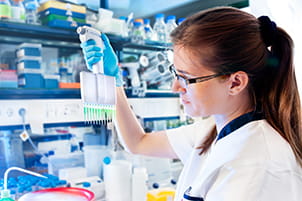Genetic Testing for Cancer
Genetic testing is the study of DNA, a blueprint found in each cell that instructs the body on how to make certain proteins. This blueprint not only determines what types of traits will get passed down from a parent to a child, but it also determines what diseases may be inherited. Some genes change, or mutate, and these mutations are replicated and passed on. By studying genes and identify patterns of mutations, we can learn how certain diseases are inherited or acquired, how they progress, how we can better treat them, and even how we might be able to prevent them from spreading in the future.
The American Cancer Society estimates that about 5 to 10 percent of cancers are thought to arise from a gene mutation that is inherited. The majority of cancers are caused by acquired gene mutations, which means the mutation occurs during the person’s lifetime.
Types of Genetic Testing
Genetic testing and screening can be broken down in four categories:
- Predictive testing – a test used to examine someone’s genes who may be at risk for inheriting a certain disease
- Carrier testing – a test used to determine if a couple is at risk of passing genetic mutations onto a child
- Prenatal screening – a test to find conditions in babies before they are born
- Newborn screening – a test to find conditions in babies just after they are born
Testing and screening are different. Testing is used as a diagnostic tool for someone who either exhibits symptoms of a disease or is determined to be at a high risk for a disease. Screening, on the other hand, is a type of test used to look for disease even when symptoms are not present.
How Genetic Testing is Performed
Elective genetic testing, like predictive testing, is only used after you and your doctor have determined that it is the best option for you. The process involves several steps:
- Risk assessment – your medical history and your family’s medical history will be reviewed in detail to determine if your risk for developing a certain disease is high enough to merit genetic testing.
- Genetic counseling – a genetic counselor can help you and your family to understand genetic testing, how diseases can be inherited, what testing will involve and what the risks might be so that you can make a confident decision about whether to undergo testing.
- Informed consent – your consent in writing will be required before any genetic testing can take place; information you should be aware of before giving consent includes the pros and cons of the test, your right to refuse testing, and how accurate the test is.
- Specimen collection – specimen collection may take the form of a blood test, urine sample, a cheek cell swab, or an amniotic fluid test.
- Evaluation of results – once your doctor receives results from your genetic test, you will meet with a genetic counselor to discuss the results and potential treatment options; you should be prepare yourself for the chance that test results may be inconclusive.
Genetic Testing at BayCare
BayCare offers the most advanced, cutting-edge diagnostic testing available, including genetic testing for cancer. If you think you may be at risk for a particular type of cancer and would like to discuss the option of genetic testing, you can find a doctor near you or call 813-870-4238. We proudly serve patients in Tampa, Riverview, Clearwater, St. Petersburg, Dunedin, Winter Haven, New Port Richey, Safety Harbor and communities throughout the Tampa Bay area.

